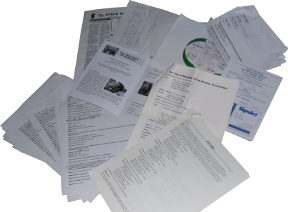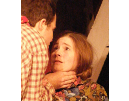
Chris Neville-Smith
Things I've done for the stage
Contents
And a Nightingale Sang (archive)
Welcome to the archive page. This is where I put the old casting information. Anyone who wants to re-use my descriptions for their own casting call is weclome to do so.
Dates:
The dates for the audition and reading are set as follows:- The read-through is on Tuesday 11th April
- The audition is on Friday 21st April
There is one difference from the normal casting process this time round. There is a lot of singing involved in this play, and therefore I will be asking who's willing to sing "That Lovely Weekend". You do not have to sing if you don't want to (it's only desirable you can sing, not essential), but if you can show me you can sing, this will help your chances (see below).
Details of DDS rules on what reading and audition entail is on my casting page. As always, if you cannot make the audition date, contact me and I will arrange another time - but it must be before the proper audition date, not after, so please give me as much notice as possible.
The rehearsal period begins on Sunday 18th June. As always, the September production has a longer rehearsal period to take into account people having summer holidays. I've not yet made a decision on whether to have two or three rehearsals a week - that will probably depend on how many rehearsals are lost to holidays. The play itself is on the Sunday 17th - Saturday 23rd September, with one additional performance on Saturday 30th September for the Little Theatre Guild Northern Conference.
What I'm looking for:
General: This is very much a round-table cast, with the seven parts having roughly equal prominence; the only exception is Helen, who narrates the story, and therefore has quite a bit more responsibility than the others. This means there are no commitment-light parts on offer, with all rehearsals having all characters in them.
This play is set on Tyneside, and is very strongly themed around life on Tyneside in the second world war, so this means I need everyone to have suitable accents (except Norman). I am not going to insist on reproducing the exact Geordie accent of the time, but I really need broad north-east dialect as a minimum. If you don't have the accent, you can be coached, but I'm afraid there's no workaround available to explain away received pronunciation.
In addition, music features very heavily in the play, and most characters are scripted as singing at some point in the script. This means I need as many of the cast as possible being able to sing. I do not expect you to sound professionally trained, but it is highly desirable that you can at least hold a tune. If anyone absolutely can't sing, I have contingency plans in place to reallocate singing to other characters, and if the worst comes to the worst and no-one will sing at all, I even have a contingency plan for that. But I intend to be pushy here and encourage everyone to join in, even people who didn't sing at audition.
Finally, be aware that this is a play that needs to be heavily choreographed. I always choreograph my plays, but this one is particularly demanding, with lot of complicated movement going on at the same time and hasty rearrangement of on-stage props for scene changes. I will not be assessing this at audition, but be aware that there's going to be a lot more to this play than simply remembering your lines.
However, if you are a newcomer to Durham Dramatic Society and you're thinking of backing out because this play is too difficult, don't. I've always worked with at least one newcomer in each play I've done and pushed them to the best of their ability, and I've been amazed what they could do.
Ages for parts below are ages as given in the story - however, there is leeway here provided the ages gaps between the different generations make sense. The individual parts are:
Helen (female, thirties): Main character in the play. Narrates the story, and if the centre of the key storyline of her romance with Norman. In the play, Helen is viewed by the family as the less pretty sister, but I'll go with any appearance because my interpretation is that it's more to do with her lack of confidence due to being known as "the cripple" for having one leg shorter than the other (don't worry about your leg length, wardrobe will sort that out). The love scenes with Norman are important, so I need someone who is comfortable with affection on stage. Not too prescriptive about age; Helen is Joyce's sister so there can't be too much of an age gap, but it needn't be the ten years given in the script.
Norman (male, thirties): A soldier, originally one of Eric's friends, soon a couple with Helen. One reason why they fall for each other is that Norman, like Helen, lacks confidence in himself. However, Norman is also cowardly in many ways, not least that he is never honest with Helen about his past. Like Helen, I need someone here who is comfortable with the on-stage affection needed for their love story. Again, I don't have to be too prescriptive of Norman's age and I could probably age up as high as plausible for a solider; however, I probably don't want someone too young because I need space for his past.
Joyce (female, twenties): Helen's younger sister. Marrying Eric shortly before he is called up for service, worries about whether he's all right soon give way to squabbles and confrontation. I don't have much leeway with age here because a lot of her impetuousness is youthful impetuousness, and as she is known as "the babe in the wood" I need someone who is conventionally attractive. Unlike Helen, there's no need for scenes of affection here (they spend most of their time arguing). However, there is a scene where Joyce and Eric dance the tango, and they need to be good. You don't need to know the dance, but you will need to learn it and be comfortable with it.
Eric (male, twenties): Begins as Joyce's suitor, swiftly becomes Joyce's husband. One of the escapees of Dunkirk, it is hinted - though never explicitly stated - that he was unfaithful to her during this time. The one thing he has in common with Joyce is youthful impetuousness. Again little need to be comfortable with scenes of affection, given it's mostly arguing, but you'll need to be comfortable with the dancing.
George (male, fifties): Also known as "the coalman", father to Helen and Joyce. George has two obsessions in life (later three after he decides that all things Soviet Union are great). The first is his post of air raid warden that he takes far more seriously than the rest of the family. The second one - and the far more important one for casting - is his piano and playing all the latest tunes. This means that this is the most important part to have someone who can sing. It would also be desirable to play the piano if possible, but that will probably only be considered in a tie-breaker situation. I have a couple of possible workarounds in mind if you can't play piano.
Peggy (female, fifties): Mother to Helen and Joyce, wife to George. The most religious of the family - hence her nickname "the saint" - also the most panic-riddled and superstitious, she seemingly spends most of her time going to or from confession, although she lets a more materialistic side slip through when she buys clothes from London of dubious origin and rationing status. Doggedly sticking to her role as homekeeper as the war goes on, relations get very strained with Helen late in the play as she learns of her increasingly unconventional relationship with Norman.
Andie (seventies): Grandfather of the family, known as the old soldier, and father to Peggy. Splits his time between his two daughters' houses, but make no secret that this one is his favourite. Taking the war the least seriously out of the family, Andie is far more obsessed with his various dubiously-acquired pets, to the point where he's prepared to misappropriate a baby respirator for his favourite cat, much to the horror of his son-in-law.
Copyright (seeing as all websites seem to need this kind of notice at
the bottom of the page) © 2011-2017. I will probably give permission
to anyone who wants to reproduce any part of this page, but please ask
me first. This is my own personal web page and not affiliated with
Durham Dramatic Society or any other group I am involved in.





